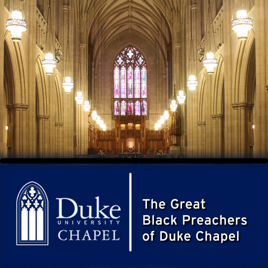
Preaching in Time and Place
Preaching is contextual. It responds to time and place – even when a preacher attempts to do otherwise. The archive allows preachers to search for sermons preached after specific historical events or watch how Duke Chapel preaching has changed over decades. Interdisciplinary teams of Duke students and faculty share their research on how sermons shape, and are shaped by, their moments in history.
Jump to:
Preaching and Protest: Duke Chapel Sermons in the Civil Rights Era (Summer 2018)
My Voice My Body: Minoritized Bodies in the Duke Chapel Pulpit (Summer 2019, 2019-2020)
The Ways Women Preach: Conversation with Leonora Tubbs Tisdale (2020)
A Sampling of African American Preachers in the Duke Chapel Pulpit (2013)
When I Was a Stranger: Immigration, Preaching, Religious Imagination (2020-2021)
Preaching and Protest | Duke Chapel Sermons in the Civil Rights Era
In the summer of 2018, a team of undergraduate and graduate students investigated the relationship between Sunday morning preaching with public protest and social change between February 1, 1960 (the Greensboro, NC lunch counter sit in) and July 2, 1964 (the passage of the Civil Rights Act). This project was a part of the Story+ and Bass Connections programs under the Franklin Humanities Institute at Duke University.
My Voice My Body | Minoritized Bodies in the Duke Chapel Pulpit
The 2019 Story+ project and the 2019-2020 Bass Connections team interrogated the intersections of body, place, and performance in the space of Duke Chapel. The students explored how the presence of women and other people whose bodies departed from the dominant figure at the pulpit influenced the sermon in the space. This project was a part of Story+ and Bass Connections, under the Franklin Humanities Institute at Duke University.
2019 Story+ project website
Duke Today article on project


I recalled that people of color were barred from this space until just a few years before my parents were born--the not-distant past. I recalled how few women and queer and trans people’s voices were allowed to fill this space. I recalled how the voices of these prophets and poets and preachers were mighty, mighty echoes in the archive, astonishing me with their courage and hope in the face of violence and pain.
Liddy Grantland '20, reflecting on her experience working on the #MyVoiceMyBody project and preaching at Duke Chapel as the 2020 student preacher.
Read the full reflection by Liddy Grantland
Ami Wong, a student researcher with the #MyVoiceMyBody project, sits down with Jeanette Stokes, the executive director of the Resource Center for Women and Ministry in the South. Stokes shares her experience of preaching at Duke Chapel when few women were invited to that pulpit.
Playlist: A Year of Listening to Women (Preview)
The Ways Women Preach | Conversation with Leonora Tubbs Tisdale
Nora Tubbs Tisdale served as the Clement-Muehl Professor of Homiletics at Yale Divinity School from 2006-2018. Her recently released book, How Women Transform Preaching (Abingdon, 2021), revises her 2019 Lyman Beecher Lectures on Preaching for those in pastoral leadership.
Her lectures included conversations with the following women in the Duke Chapel digital archive:
- Carol M. Norén, Showboat (June 19, 1994)
- Christine Smith, Spreading and Moving the Table (March 9, 1997)
- Jana Childers, With Both Ears Tingling (December 13, 1998)
Watch an interview with Tisdale about why women's voices a the pulpit matters, followed by discussion questions on sermons by these three women.
A Sampling of African American Preachers | in the Duke Chapel Pulpit


One thing I enjoy is that -- from Howard Thurman to Martin Luther King Sr., from Peter Gomes to Cynthia Hale -- this archive exemplifies that black preaching is not monolithic. One can't essentialize blackness or black religion or black Christianity. There is great diversity and variety within the so-called black church preaching traditions.... Underneath this is an implicit cultural pedagogy to hear these different voices, including more and more black women voices."
-- Dean Luke Powery in interview for Duke Today in 2013. Read the full article
When I was a Stranger | Immigration, Preaching, & Religious Imagination

Because of the COVID-19 pandemic, the research team met remotely during the 2020-21 year.
The 2020-21 Bass Connections project explores how sermons at Duke Chapel have addressed important questions of hospitality and public policy in a religious tradition that sees God as “the other” and Jesus as the "stranger."
2020-21 Bass Connections project website
As the research team analyzed sermons about immigration from the Duke Chapel archive, one key theme they found was the absence of immigrant voices themselves from the pulpit. The team invited both a community leader working with immigrant communities and a DACA recipient to listen to a selected sermon from the archive and share their reflections.
Interview Team Members: Benjamin Crook, Brittany Darst, Ami Wong
Immigration and Intersectionality: Reflections by Keith Daniel
The Rev. Dr. Keith Daniel shares his reflections after listening to a sermon preached by Will Willimon, "When the Outsiders Become Insiders" (May 10, 1998).
"Am I Still a Stranger?": Reflections of an Immigrant Preacher"
Cristal Jiménez, a preacher in Duke Divinity's Hispanic Latino Preaching Initiative, shares her perspective on "King-Making," a 1975 sermon by Roman Catholic priest and peace activist Philip Berrigan.
Immigrant Voices at the Pulpit
How do preachers faithfully preach about the experiences of those who had to leave their homes in hopes of a better life elsewhere? The students in the 2020-2021 Bass Connections project "When I Was a Stranger" raised those questions as they found few sermons about immigration from the Duke Chapel archive preached by immigrants themselves. One student, Crystal Chiu, wondered if preachers could invite more immigrant voices to the pulpit.
Watch a pair of videos in which Chiu engages with these questions and does a performance reading of Iranian-born poet Sholeh Wolpé’s “Dear America” from the Duke Chapel pulpit.

